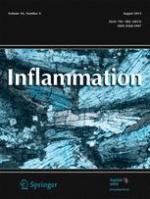Citation:
Ginsburg I, Quie PG. Modulation of human polymorphonuclear leukocyte chemotaxis by leukocyte extracts, bacterial products, inflammatory exudates, and polyelectrolytes. Inflammation. 1980;4 (3) :301-311.

Abstract:
Human polymorphonuclear leukocytes (PMN) chemotaxis was tested during exposure to leukocyte and platelet extracts, a variety of polyelectrolytes, inflammatory exudates, and bacterial products. The chemoattractants employed were either zymosan-activated serum or supernatant from autolyzed Staphylococcus aureus. Chemotaxis to both chemoattractants was markedly inhibited by leukocyte and platelet extracts; inflammatory exudates; anionic polyelectrolytes, DNA, hyaluronic acid, liquoid; and by cationic polyelectrolytes, histone, protamine base, protamine sulfate, and myeloperoxidase. Inhibition was also found with elastase, collagenase, pepstatin, and epsilon-amino-caproic acid. Bacterial products, such as lipoteichoic acid and lipopolysaccharides, and extracts of human dental plaque inhibited chemotaxis. No inhibition of chemotaxis was observed with heparin (< 10 micrograms/ml), chondroitin sulfate, phosphatidylethanolamine and phospatidylserine. Indeed, chondroitin sulfate markedly enhanced chemotaxis and antagonized the inhibitory effect of leukocyte or platelet extract. None of the agents employed was toxic to PMN as judged by trypan blue exclusion. These observations suggest that cationic polyelectrolytes and inflammatory exudates influence PMN surfaces, modifying interaction with chemoattractants. Assessment of the role of PMN chemotaxis in host defense against microbial invaders requires evaluation of the response in the presence of agents likely to be present in inflamed tissues.Publication Global ID: http://www.ncbi.nlm.nih.gov/pubmed/7429609

